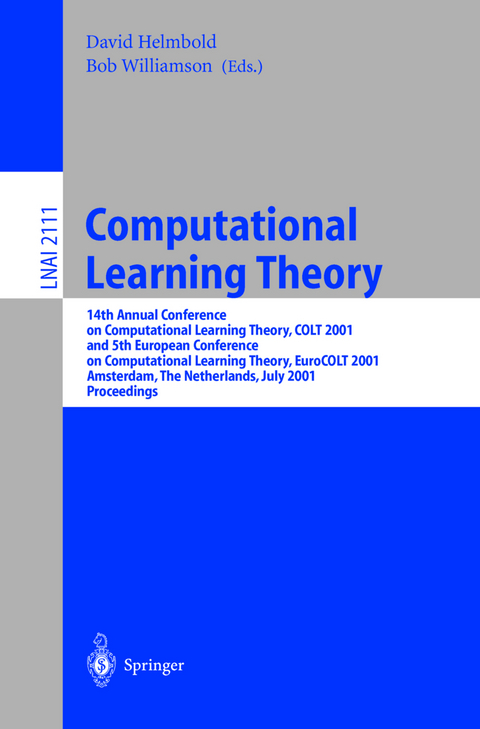
Computational Learning Theory
Springer Berlin (Verlag)
978-3-540-42343-0 (ISBN)
How Many Queries Are Needed to Learn One Bit of Information?.- Radial Basis Function Neural Networks Have Superlinear VC Dimension.- Tracking a Small Set of Experts by Mixing Past Posteriors.- Potential-Based Algorithms in Online Prediction and Game Theory.- A Sequential Approximation Bound for Some Sample-Dependent Convex Optimization Problems with Applications in Learning.- Efficiently Approximating Weighted Sums with Exponentially Many Terms.- Ultraconservative Online Algorithms for Multiclass Problems.- Estimating a Boolean Perceptron from Its Average Satisfying Assignment: A Bound on the Precision Required.- Adaptive Strategies and Regret Minimization in Arbitrarily Varying Markov Environments.- Robust Learning - Rich and Poor.- On the Synthesis of Strategies Identifying Recursive Functions.- Intrinsic Complexity of Learning Geometrical Concepts from Positive Data.- Toward a Computational Theory of Data Acquisition and Truthing.- Discrete Prediction Games with Arbitrary Feedback and Loss (Extended Abstract).- Rademacher and Gaussian Complexities: Risk Bounds and Structural Results.- Further Explanation of the Effectiveness of Voting Methods: The Game between Margins and Weights.- Geometric Methods in the Analysis of Glivenko-Cantelli Classes.- Learning Relatively Small Classes.- On Agnostic Learning with {0, *, 1}-Valued and Real-Valued Hypotheses.- When Can Two Unsupervised Learners Achieve PAC Separation?.- Strong Entropy Concentration, Game Theory, and Algorithmic Randomness.- Pattern Recognition and Density Estimation under the General i.i.d. Assumption.- A General Dimension for Exact Learning.- Data-Dependent Margin-Based Generalization Bounds for Classification.- Limitations of Learning via Embeddings in Euclidean Half-Spaces.- Estimating the OptimalMargins of Embeddings in Euclidean Half Spaces.- A Generalized Representer Theorem.- A Leave-One-out Cross Validation Bound for Kernel Methods with Applications in Learning.- Learning Additive Models Online with Fast Evaluating Kernels.- Geometric Bounds for Generalization in Boosting.- Smooth Boosting and Learning with Malicious Noise.- On Boosting with Optimal Poly-Bounded Distributions.- Agnostic Boosting.- A Theoretical Analysis of Query Selection for Collaborative Filtering.- On Using Extended Statistical Queries to Avoid Membership Queries.- Learning Monotone DNF from a Teacher That Almost Does Not Answer Membership Queries.- On Learning Monotone DNF under Product Distributions.- Learning Regular Sets with an Incomplete Membership Oracle.- Learning Rates for Q-Learning.- Optimizing Average Reward Using Discounted Rewards.- Bounds on Sample Size for Policy Evaluation in Markov Environments.
| Erscheint lt. Verlag | 4.7.2001 |
|---|---|
| Reihe/Serie | Lecture Notes in Artificial Intelligence | Lecture Notes in Computer Science |
| Zusatzinfo | DCXLVIII, 638 p. |
| Verlagsort | Berlin |
| Sprache | englisch |
| Maße | 155 x 235 mm |
| Gewicht | 894 g |
| Themenwelt | Informatik ► Theorie / Studium ► Algorithmen |
| Informatik ► Theorie / Studium ► Künstliche Intelligenz / Robotik | |
| Schlagworte | Algorithm analysis and problem complexity • Algorithmic Learning • algorithms • Boosting • classification • Cognition • Complexity • Computational Learning • Computational Learning Theory • Data Mining • Game Theory • Hardcover, Softcover / Informatik, EDV/Informatik • HC/Informatik, EDV/Informatik • inference • Kernel Method • Learning theory • Optimization • Q-Learning • query processing • Reinforcement Learning • Robust Learning • Statistical Learning |
| ISBN-10 | 3-540-42343-5 / 3540423435 |
| ISBN-13 | 978-3-540-42343-0 / 9783540423430 |
| Zustand | Neuware |
| Haben Sie eine Frage zum Produkt? |
aus dem Bereich


